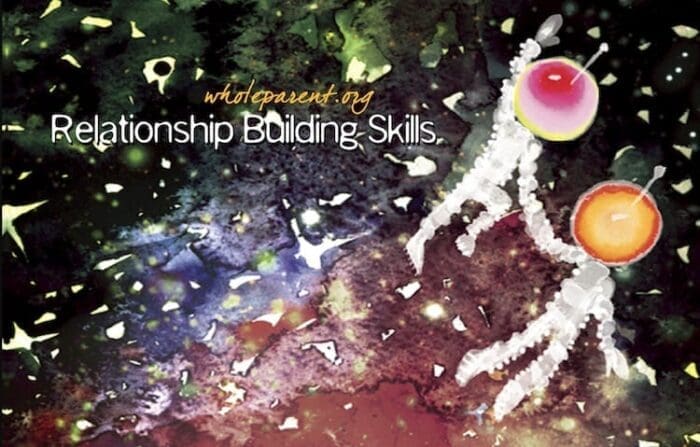It is probably not a far fetched idea that we all have hidden pain inside our hearts and minds. Often, part of any relationship-building experience is learning that OUR emotional pain is ours alone. And the harder lesson: the emotional pain of our partners is most definitely NOT OURS. “Stay in your lane” means learning to support your partner when they are in pain, but not to take that pain on as yours to solve. We cannot solve the emotional pain of our partners. What we can do is stand strong beside them, assure them that we are listening and empathetic, and then be quiet and let them tell us what they need. Often, what they need may not involve you or your input.
+++ Listen to this article on Love on the Air +++
+++
What Is Emotional Intelligence?
When I refer to emotional intelligence, I’m referring to a specific skill at owning your own shit and leaving the shit of others to themselves and perhaps their therapists. And the deeper essence is this: my partner cannot make me happy when I am struggling with my own demons. My partner may trigger me with their behavior or something they say, but when the response is rage or isolating indifference (the “fuck it” response), the issue is probably not about the relationship between the partner and myself. I have to own my own pain, frustrations, and irrational rages. Then, I have to acknowledge my ownership of my fucked-up-ness and let my partner off the hook. In releasing our partners, with a simple phrase (“I’m triggered and I know this is bigger than us.”) we can put our partners at ease. After all, if the pain and upset is pulling up something deeper and more painful than we can process in the moment, it’s best to own that pain and let our partners know we intend to deal with it on our own.
When we begin blaming our partners for our distress we are heading down an unfruitful path. My partner may have forgotten a chore they agreed to do last night, but when my response takes on the tone of “you never follow through” or “it’s always my responsibility…” it’s a pretty clear indication that I may be triggered. The moment has caused me to re-experience some past trauma, past relationship failure, and then it is my responsibility to take this hyper-response offline, to my support team, and off my partner’s plate.
Brené Brown’s BRAVING Gives Us a Framework for Healing
Boundaries | You respect my boundaries, and when you’re not clear about what’s okay and not okay, you ask. You’re willing to say no.
Reliability | You do what you say you’ll do. At work, this means staying aware of your competencies and limitations so you don’t over-promise and are able to deliver on commitments and balance competing priorities.
Accountability | You own your mistakes, apologize, and make amends.
Vault | You don’t share information or experiences that are not yours to share. I need to know that my confidences are kept, and that you’re not sharing with me any information about other people that should be confidential.
Integrity | You choose courage over comfort. You choose what is right over what is fun, fast, or easy. And you choose to practice your values rather than simply professing them.
Nonjudgment | I can ask for what I need, and you can ask for what you need. We can talk about how we feel without judgment.
Generosity | You extend the most generous interpretation possible to the intentions, words, and actions of others.
Of course, there are other systems for navigating relationship struggles, but I find BRAVING has all the elements.
The two main points of BRAVING that apply to my “triggered” approach are Boundaries and Accountability. Let’s examine each part and see what strength we can gain from picking up our game in our relationships.
Boundaries
This one is a core skill we can all do better at. Here are a few of my boundary challenges:
- When you are upset I want to own the responsibility for you being upset (it’s my fault you are mad)
- When I hear you talking about someone else’s relationship it feels like gossip, unless you are sharing to provide essential information about OUR relationship, please keep other’s relationship struggles out of our conversations
- When I am mad I want to point the finger at your actions, but often my inner rage is what needs boundaries, you can make me mad, but you can’t make me THAT mad
- When we are going through challenges I expect our boundaries to be respected (you own when it’s your issue, I”ll own when it’s mine)
Accountability
- When I say I will do something, I always follow through or follow-up with a plan
- When I am triggered and need a time-out to sort myself out, I will ask for the repair (returning to the relationship for the rejoin after I’ve processed my own emotional hurt)
- My anger (sadness, mania, arousal, frustration) is mine, I will not blame you for those emotions, nor will I ask you to fix them
- I am good with my word
- I have to believe you 100% when you tell me something is true (trust only happens over time, and with a lot of practice and a lot or repairs)
The Repair Is the Most Important Part
When “events” happen in our relationships it is common for us to retreat a bit. We might go off to work, or off to our corners of the house, to get some space and time to sort out what we are feeling. Once we have identified the trigger and dealt with the internal upset we encountered, it is important to rejoin the relationship at some point. It is most helpful when the “triggered” partner is the person who asks for the repair. It might sound like this.
“I’m sorry I blew up about the laundry. I have some work to do on some issues from my past. It’s not about you. I can own it and work on it. I will do my best to not blow up at you about anything, and specifically about the laundry. Let’s come back together and come up with some ideas to keep the clothes from piling on the floor of the bathroom.”
Micro Corrections in Love Relationships
The astronauts heading towards the moon did not just set their navigation computer and forget about it. No, the entire flight to the moon was filled with micro corrections and readjustments of their trajectory and speed. Relationships are the same. We need to micro correct all the time. The trick in keeping your relationship vibrant and healthy, is to micro correct towards each other, towards the join between you. By showing your partner you are willing to own and handle the little issues that come up during the course of a week, you are giving them assurances that you can do the same over the longer trajectory of your relationship.
We don’t miraculously find our soulmate and then get to relax into relationship bliss. Soulmates are created over time, as we lean into each other, micro correct towards our mutual goals, and continue to own our separate issues when they come up. As we learn our partner’s triggers we can adapt some of our behaviors, we can set alternative action plans to lessen the chance of a blowup, and we can assure the other person that you are both copilots. Both of you have individual flight plans and relationship flight plans. Both of you are responsible for your own actions and reactions. The trick is keeping it out in the open and flexible as you blast off towards the stars together.
I’m going to the moon and I’m taking you with me.
If we are on a journey of relationship building, we’ve got to be prepared to learn new skills, find new ways to connect with each other, and avoid things that hurt or trigger our partners. We’ve got to prepare our moonshot with the assumption that we are going together. If you’re on board the rocketship with a partner, you are copilots and co-navigators in determining how to arrive safely at your destination. And if the destination is a higher love within a long-term partnership you’ve got to include your partner’s dreams and star maps in the collaborative flight plan.
For the duration of the journey, you’ve got to consider the other person’s well-being at all times and act accordingly. Sometimes this means pushing back with healthy boundaries and adjustments to the original flight plans. Sometimes this means giving your partner the benefit of the doubt, even when they seem to be acting in a hurtful manner. Most likely, their training and experience need more compassion and exploration, and perhaps their star maps need updating with new information. In a truly collaborative relationship, it is easier to explore solutions, execute a creative change of plans, and align your micro-adjustments towards your partner’s wants and needs.
When there is a disturbance in the connection between you and your copilot, always ask for a reset and clarification. Only through understanding and deep listening can we align more frequently and in healthier ways.
Namasté,
John McElhenney – life coach austin texas
Facebook | Instagram | Pinterest | @wholeparent
Related posts:
- 3 Required Traits for Building a Lasting Relationship
- Emotional Intelligence Essentials for Long-Term Relationship Success
- Pausing in the Gap: Trying to Force An Answer Is Not the Way
- 7 Habits of a Sizzling Sex Life: Relationship Building
- The 3-point Formula for Loving Relationships: Where You Lead I Follow
You can find all of my books on AMAZON.






